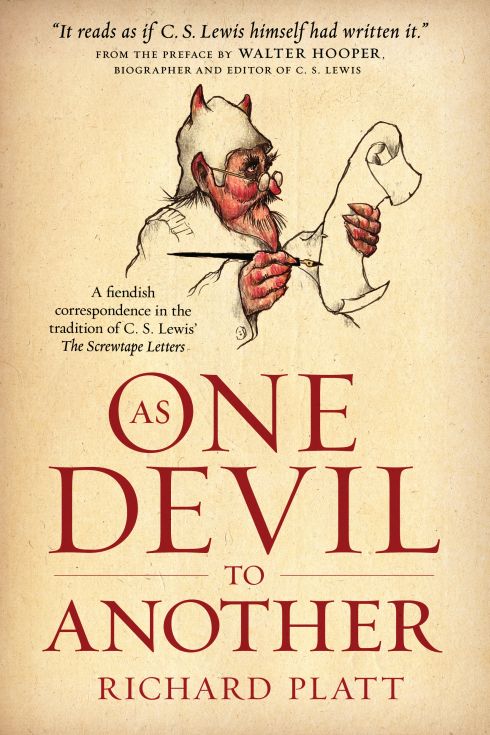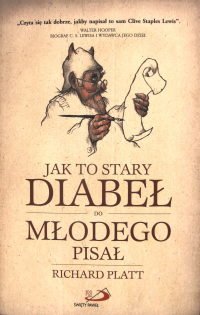AODTA: Frequently Asked Questions
C. S. Lewis said that in writing The Screwtape Letters he had never written with greater ease or less pleasure; that it was all 'dust, grit, thirst, and itch'. What was your experience of immersing yourself in the devilish persona?
I also wrote with great ease, though I suffered nothing of the 'spiritual cramp' that Lewis endured; quite the contrary. I enjoyed myself enormously, like a badly behaved child left home alone, and have long pondered the fact that my experience was not only different from Lewis's, but antithetical.
The most obvious explanation, of course, is that Lewis was a better man than I am, which is certainly true, but, I hope, is not sufficiently true to explain the difference. Lewis returned to the devilish persona in 1961 with 'Screwtape Proposes a Toast', presumably because he had circumvented or overcome the unpleasantness. A close reading of both the original Screwtape and the later incarnation reveals why.
Lewis was a very private man. He tells us in the 1961 introduction to both Screwtapes that it was not vast reading but his own heart that had given him his knowledge of human folly and frailty and vice. In fact, Screwtape, like The Pilgrim's Regress and Surprised by Joy, is an account of Lewis's own spiritual journey, but in Screwtape he reveals his own struggles as he reveals them nowhere else, and it is this that is causing the 'spiritual cramp'. The original Screwtape looks inward; the later Screwtape looks outward, and the discomfort is relieved. So it is with As One Devil to Another: As One Devil to Another is not a work of introspection, but of observation. The devil looks out upon the world and sees that it is 'good'.
Can you describe the genesis of As One Devil to Another in more detail? How long did it take to write?
On the night of 9 October 2009, at 7:00 PM, as I was enjoying a quiet moment with a cup of tea, gazing out a window, thinking about nothing in particular, this book began. I recall the moment vividly. It is not the kind of experience that is easily forgotten. First, it simply occurred to me that there were a great many things in this world in need of Screwtapean treatment. Topics presented themselves. Then something very different happened. The first of what would be thirty-one letters began: I heard it. Incredulous ( Who would not be?), I ignored what I was hearing, but it would not stop. After two listless days and two sleepless nights I put pen to paper, simply to relieve the pressure, and the floodgates opened. It was like taking dictation.
Five exhausting weeks later the last letter was complete, and the voice ceased. That is how this book came to be. I am aware of how peculiar this sounds, but it is no less true for that. As C. S. Lewis observed, no man can say 'mine' of anything.
The narrative voice of As One Devil to Another is at times quite harsh. Would you care to comment on this?
In As One Devil to Another, it is the devil who is speaking. One does not expect the devil to be charitable, nor to mince words; he does not, except when it is to his advantage, as when he is lying.
Part of the task of writing As One Devil to Another involved a reimagining of the Screwtapean voice. Screwtape's voice changed in the twenty years between 1941 and 1961. It became angrier, more strident as Lewis become increasingly distressed with the moral relativism that surrounded him.
In reimagining the Screwtapean voice, I asked how that voice would have changed had Lewis lived to see what the world has become fifty years after his death. I think he would be appalled. He would see we are living in a time that is every day growing more spiritually deaf, and his Screwtapean narrative voice would reflect that. He would realize that a man who is afraid to shout will simply not be heard. I chose to do a bit of shouting.
A few persons who saw this book in manuscript – happily, a small minority - took offense. I find this curiously consoling. The shot had gone home, touching the raw nerve at the center. The man who is caught behaving shamefully, having no logical or moral defense for his behavior, often responds not with contrition but with invective. When asked, no one who responded to this book in anger could point to a passage that they were willing to refute. Thus, to the reader who grows angry as he reads I say simply, "Beware."
Though I have chosen to thrust the knife in deeply, I have not exaggerated. I did not need to. For example, the preposterous 'works of art' depicted in Letter XV are all real. I made up none of them. And consider this: they were paid for with public money.
Based on the critical response to As One Devil to Another, it would appear that I have succeeded, at least stylistically. One unfortunate woman, a blogger, of course, thinks I am the devil, which is, I suppose, a kind of back-handed compliment. I am reminded of the country parson who objected to The Screwtape Letters because their advice was 'positively diabolical'.
Is As One Devil to Another available in other languages?
Yes. It is licensed for translation in Dutch, Norwegian, and Polish, with other translations to follow.




